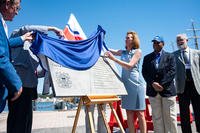The top officer of the Marine Corps wanted to expand the service's cyber community, and he's looking at ways to make the job more appealing to qualified Marines.
Speaking at the Surface Navy Association's annual symposium Thursday, Gen. Robert Neller said he is entertaining several options to recruit and retain a growing cyber force.
At Marine Forces Cyber Command, there are about 1,000 uniformed troops and civilians, he said, and most have military occupational specialties in signals intelligence, data, networks or cyber protection.
"There's no cyber MOS," he said. "How am I going to keep them? We spent a lot of money training these Marines."
The service is planning for a modest force increase from 182,000 to 185,000 troops, awaiting final approval by Congress in the 2017 Defense Appropriations Bill, Neller said.
He has said previously that he wants to use those additional Marines to expand fields including cyber and electronic warfare. If the increase is not forthcoming, he has said he will consider shrinking larger fields such as infantry to increase the size of these growing specialties.
Meanwhile, he worries about getting and keeping the right Marines without the kind of job enticements available in other high-demand fields.
"There should be some way to figure out how to have a cyber guarantee in that occupational field," he said. "And we're behind in figuring that stuff out."
Speaking to reporters afterward, Neller said he is assessing what other services are doing to decide the right way forward for the Marine Corps.
"Most of these people come off and start off as communicators or intelligence folks or radio battalion people, and then they morph and they get trained," he said. "So we've got to go back and map the path, and figure out, is it really somebody you can bring in from the beginning."
It's possible, he said that the service will create a system similar to that employed by Marine Corps Forces Special Operations Command, which admits qualified Marine applicants who already have several years of service and experience.
In such a scenario, "you come in and become a Marine and establish your credentials as a Marine, and then you have some sort of test and evaluation where you apply and you go on from there," he said.
There's not yet a timeline for the Corps to make a decision on how to proceed with developing a cyber MOS or career path.
-- Hope Hodge Seck can be reached at hope.seck@military.com. Follow her on Twitter at@HopeSeck.
Don't Miss a Single Military.com Story
To read the full article and get exclusive benefits, sign up today.
It’s FREE
Why am I seeing this? Visit our FAQs




























